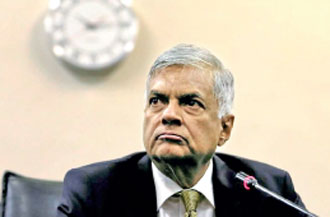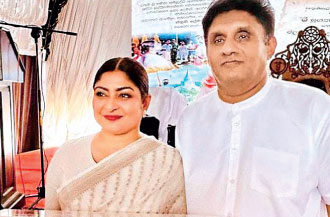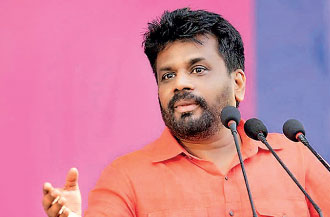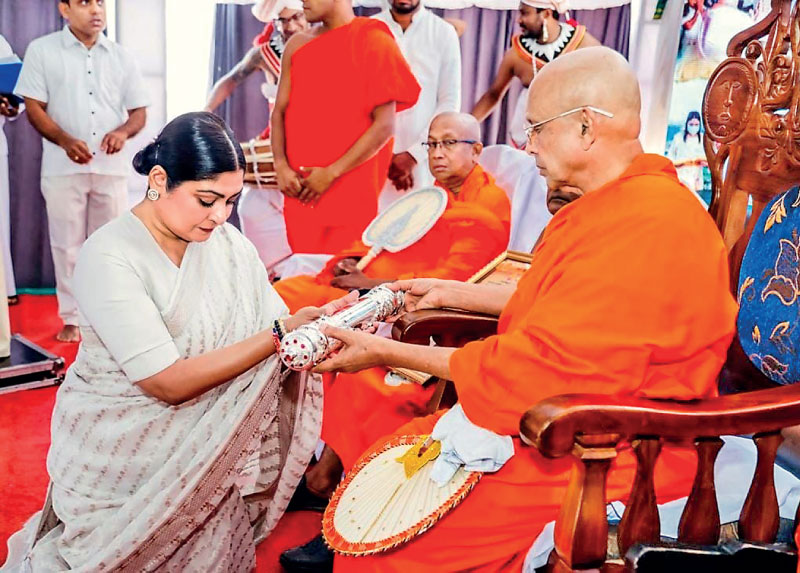Wednesday Feb 18, 2026
Wednesday Feb 18, 2026
Thursday, 22 June 2023 01:25 - - {{hitsCtrl.values.hits}}

Ranil: Clock’s ticking

Mainstream contender Sajith

Anura on message

Jalani: Rare award
|
 All scenarios beyond the next 18 months must necessarily be ‘post-Ranil’ because, try as he might, Wickremesinghe cannot transcend the objective parameters of reality any more than any of us can. He is an unelected president, unelected either by the popular vote to the presidency or by popular vote to the Parliament which picked him by a majority vote to take over from President Gotabaya Rajapaksa. He is, just as President D.B. Wijetunga was after he assumed presidential office upon the assassination of President Premadasa, a transitional president, playing out the rest of his predecessor’s term.
All scenarios beyond the next 18 months must necessarily be ‘post-Ranil’ because, try as he might, Wickremesinghe cannot transcend the objective parameters of reality any more than any of us can. He is an unelected president, unelected either by the popular vote to the presidency or by popular vote to the Parliament which picked him by a majority vote to take over from President Gotabaya Rajapaksa. He is, just as President D.B. Wijetunga was after he assumed presidential office upon the assassination of President Premadasa, a transitional president, playing out the rest of his predecessor’s term.
Unlike D.B. Wijetunga, Wickremesinghe does not adhere to such political parameters. When he was elected Prime Minister in 2001, he began to behave as if he was the President. He was ousted by the real President, Chandrika Kumaratunga in late 2003. She followed this up with a general election in 2004, at which the grateful public confirmed her decision.
It took Wickremesinghe roughly 15 years to be re-elected Prime Minister, in August 2015. Once again he thought himself the President and was ousted by the actual one. The Supreme Court did not overturn that decision but its corollary, namely the attempt by President Sirisena to repeat CBK’s move and hold a snap General Election. That went contrary to the 19th Amendment. The attempt failed and Wickremesinghe was reinstated as Prime Minister, to a cheering UNP – including the current SJB—and Colombo’s civil society, which had, with their congenital myopia, failed to read the writing on the wall, spray-painted in February 2018 at the local authorities election, in which a newly-minted party the SLPP had wiped the floor with the two ruling parties, the UNP and the SLFP.
When the people (as distinct from ‘civil society’) got a chance to vote, they didn’t re-elect Wickremesinghe or a single member of the UNP to Parliament in August 2020. The ex-UNPers who made it to Parliament did so only because they climbed on board the life-raft which Sajith Premadasa had floated, with the legitimacy of having run against Gotabaya Rajapaksa in November 2019 and acquitted himself pretty decently, missing the magic 50% by only 8%.
Post-Ranil politics
Wickremesinghe was not elected by the people to the presidency. He was not elected by the people to the Prime Ministership. He was not elected by the people to the parliament. He was allocated a seat in parliament because his party had scored a minimum number of votes island-wide to afford it a single nominee in the legislature. Having been hoisted to the top by the ruling SLPP he has developed an allergy to submitting himself once again to a vote by the sovereign people. He regards himself the sovereign.
Ranil is doing today exactly as he did in 2001 and 2015 and for exactly the same reason: vaulting hubris. In 2001 and 2015, he was a Prime Minister who thought he was the President, behaved like it, and lost his job. In 2023, he is a President appointed by a majority in Parliament—unlike his predecessor President D.B. Wijetunga who was appointed unanimously by Parliament—but seems to think he is a popularly elected president, with a popular mandate, and he acts as if he is.
Wickremesinghe has made too many enemies on too many fronts. Those enemies are strikingly diverse. They are not individuals, and the enmity isn’t personal. These are social forces, from labour unions to Buddhist clergy. Only one thing unites them, namely the composite challenge, political, logical, moral and ethical, that they hurl in his face: “Who gave you a mandate to say and do this? If you want to do them, go get a mandate from the people and we’ll shut up however reluctantly—but unless you do, and until then, we shall resist you”.
President Wickremesinghe has barely surfaced into double-digits in the opinion polls but to hit 50% and win a Presidential election is wildly improbable mathematically. He doesn’t have a political party that can engage in the ground game necessary to get a decent vote. Ranil’s assets in the SJB haven’t managed to deliver him a substitute party, displacing or downsizing Sajith Premadasa.
On the contrary, the Galigamuwa Cooperative Society election was won by the SJB topping 50%. Meanwhile the rare honour of an impressively esoteric title ceremonially bestowed on the gracious, genial and sharply discerning Jalani Premadasa by the Maha Sangha of the Three Chapters is a significant signpost.
Ranil can’t contest and win a Presidential election as J.R. Jayewardene did in October 1982. JRJ led a UNP which enjoyed a 5/6th majority in the House, and faced a decapitated Opposition (with Madam Bandaranaike deprived of her civic rights) and an ineffectual opponent in Hector Kobbekaduwa, against the backdrop of a growing economy with a prosperous rural economy thanks to the (state-driven) Accelerated Mahaweli Scheme.
Ranil has against him two major-league Oppositional formations (SJB and NPP-JVP) headed by two young leaders who are superb speakers (Sajith and Anura Kumara), and an environment of economic constriction generating poverty and deprivation. No incumbent wins in a context of economic shrinkage and austerity, least of all when he has done the shrinking.
UNP’s referendum rhetoric
UNP Chairman Vajira Abeywardena urged at a district conclave of the party that a referendum should be held as JR did in 1982, to enable Ranil to remain President without an election as JR did for 12 years. (https://fb.watch/lgo58i2HOk/?mibextid=xJqJ3l)
This is both a lie as well as a suicidally moronic suggestion. That’s not what JRJ did. JR called the presidential election and beat the challenger Hector Kobbekaduwa in October 1982.
With that electoral victory under his belt, he made the most counter-productive decision in Sri Lanka’s post-independence history by calling for a Referendum in December 1982 to extend the life of parliament—not the presidency—by six years.
Black July 1983, two massive civil wars and a foreign intervention came downstream from JR’s folly of the December 1982 Referendum and were consequences of it.
JR had legitimacy but his parliament didn’t, because he won his presidential election but froze the parliamentary election by six years. Ranil is being tempted into widening his gaping legitimacy deficit by not holding a presidential election next year.
JR’s freeze of a parliamentary election drove ethnic, socioeconomic and political tensions into ultra-violent channels. If Ranil blocks a Presidential election, the backlash will be bigger, fiercer. JR blundered against the backdrop of economic prosperity. Ranil will be doing so against the backdrop of economic contraction.
With the support of the country’s largest single party, JR committed the folly which the UNP, democracy, the market system and the Sri Lankan state almost never came back from. Ranil would be doing so with a political-organisational reed (UNP-SLPP) to cling to. Premadasa saved the UNP and the system in 1988. Sajith is in contention in 2024 but may be blocked from saving the system if Ranil keeps derailing elections, especially next year’s.
As Chilean dictator (and self-appointed President) General Augusto Pinochet realised, the easiest thing to lose is a Referendum, and then, military or no military, you negotiate your exit. If Ranil holds a Referendum the entire Opposition will be united in calling for a ‘NO’ vote, and even the ruling SLPP will splinter. The Opposition may campaign together but doesn’t have to; the SJB and JVP-NPP can campaign separately, while calling for the same thing. Civil society will join the campaign, and the Aragalaya will revive not as a protest movement but as civic movement calling for a resounding ‘NO’ vote.
There will be only one target: the incumbent with his Referendum project to rob the Sri Lankan people of their sacred right --which they were the first to enjoy in Asia and Africa—to choose a ruler of their preference, who will manage the crisis less unfairly and painfully, and midwife the country’s re-birth.
Doomsday button
What of the Doomsday option, i.e., holding a referendum to postpone the election while coercively holding down the citizens as in December 1982? Ranil was enthusiastically in the forefront of that.
A repressive referendum would be the portal to revolution. Sri Lanka has the factors necessary for a successful revolution almost —but not quite—in full measure.
 An economic crisis which has been responded to with a neoliberal policy strategy that is causing rising poverty, inequity and social underdevelopment.
An economic crisis which has been responded to with a neoliberal policy strategy that is causing rising poverty, inequity and social underdevelopment.
 A ruler who suffers from a massive legitimacy deficit because he has not been popularly elected, and lacks a stable political base of popular support.
A ruler who suffers from a massive legitimacy deficit because he has not been popularly elected, and lacks a stable political base of popular support.
 A population which, going by an opinion poll run by a Harvard-trained professional, endorses ‘socialism’ and increasingly eschews ‘capitalism’.
A population which, going by an opinion poll run by a Harvard-trained professional, endorses ‘socialism’ and increasingly eschews ‘capitalism’.
 A citizenry that just last year rose up and threw out a ruler it had elected by a sweeping majority three years before.
A citizenry that just last year rose up and threw out a ruler it had elected by a sweeping majority three years before.
 The strongest, most massive Left movement we have seen in at least a half-century, perhaps more-- comprising the JVP-NPP, and the FSP-IUSF.
The strongest, most massive Left movement we have seen in at least a half-century, perhaps more-- comprising the JVP-NPP, and the FSP-IUSF.
Just one firewall exists between rampant poverty and an unelected ruler on the one hand, and renewed rebellion culminating in revolution on the other: the hope the people still have of changing things peacefully, by their vote, next year, i.e., Presidential election 2024.
Slow soft Opposition
This year, 2023 is the run-up to Presidential election year 2024, but the SJB isn’t running up. It should study the JR-Premadasa UNP on the offensive in pre-election year 1976.
The SJB savages the incumbent with a powder-puff: we can work with him, but Ranil is keeping the wrong company, has the wrong team. The party is not immunised against the ideological virus that it should ‘work with’ or go easy on Ranil because it supposedly has more in common with the latter’s economic ideas than not. Such nonsensical notions were anathema to the thinking of JR, Premadasa and the UNP in 1973-1977.
In 1975, the LSSP was kicked out of the Government by the Bandaranaikes. Felix Dias Bandaranaike took over as Finance Minister from Dr. N.M. Perera. FDB turned Seevali Ratwatte’s report on the Shannon Free Trade Zone into the Foreign Investment Guarantee Law (1975). One may have thought that JRJ who had advocated cooperation with the Sirimavo government in 1972 would welcome this rightward turn in economic policy. Instead, the UNP cooperated with the LSSP and the leftwing independent Prins Gunasekara to bombard the SLFP-led Government with No-Confidence Motions.
JR and Premadasa remembered Felix Dias Bandaranaike’s public advocacy of “a little bit of totalitarianism” and regarded him as the most likely advocate of Prime Minister Sirimavo Bandaranaike seeking a further extension in office and the postponement of the General Election (already two years delayed) due in 1977.
Despite the economic crisis and the unprecedentedly awful suffering of the people due to NM’s policies, and dismissing all considerations of economic congruency, the JR-Premadasa UNP took aim at the most rightwing-authoritarian element in power, demonising Felix and vilifying Sirimavo in ditties and cartoons (the famous ‘Family Tree’ cartoon book), temporarily allying with the Left while in Opposition.
The brilliant, independent-minded Ronnie de Mel, picked as Finance Minister by JR in 1977 was one of the most left-leaning MPs on either side of the House.
On May Day 1977 the UNP’s official newspaper Siyarata carried a special edition with its front page printed in green and a hammer-and-sickle in red in montage.
The 1975-1977 UNP took a political stance of frontal confrontation vis-a-vis the regime, despite the government’s re-composition and rightward economic pivot. The UNP’s offensive was the total opposite of the “let’s converge on a common economic ideology which we share with President Ranil!” line of the SJB Economic Blueprint’s author. The JR-Premadasa Opposition didn’t let economics and economists delay, dilute or deflect its politics.
Sajith’s SJB and the GL-Dullas led FPC represent the progressive aspects of the UNP and SLFP traditions respectively and could construct a viable social democratic centre with a progressive policy platform—but are painfully slow. The formidable SLFP-LSSP-CPSL United Front of 1968-1970 which scored an unprecedented 2/3rds majority at the parliamentary election of 1970, unveiled its Common Program at a huge rally at Bogambara in 1968, two years before 1970. (My father took me along for it).
|
AKD’s asymmetries and antinomies
Unlike the SJB, the JVP-NPP maintains an adequately brisk pace. Anura Dissanayake is mostly on message, pitch perfect as when addressing a responsive audience at the NPP Anuradhapura District Convention of the Tri-Forces Retirees Forum on 18 June 2023.
(https://www.youtube.com/live/bPrv5IheS8s?feature=share.)
However, he has to address an asymmetry; resolve or reconcile an antinomy in his strategic political thinking.
 On the one hand, he says that elections are not being held and will not be held, not simply because Ranil is afraid of losing—because he has lost many more elections than he has won—but because Ranil is afraid that the JVP-NPP rather than anyone else would win, generating an unprecedented power-shift to the people, away from the family-based elite Establishment in which AKD explicitly includes Sajith Premadasa and the SJB.
On the one hand, he says that elections are not being held and will not be held, not simply because Ranil is afraid of losing—because he has lost many more elections than he has won—but because Ranil is afraid that the JVP-NPP rather than anyone else would win, generating an unprecedented power-shift to the people, away from the family-based elite Establishment in which AKD explicitly includes Sajith Premadasa and the SJB.
 On the other hand, AKD says that Ranil’s attempt to postpone elections next year will fail inevitably; self-destruct almost automatically.
On the other hand, AKD says that Ranil’s attempt to postpone elections next year will fail inevitably; self-destruct almost automatically.
The two ideas are contradictory. If the project of the postponement of elections is due to class dynamics rather than politics and personal greed for power, then there will be a class compact undergirding it which will be far deeper and more resourceful than just Ranil and the residual, revanchist UNP-SLPP. It won’t inevitably and automatically collapse as AKD confidently asserts.
If on the other hand, it is mainly a Ranil-UNP-SLPP project, an agenda of the ruling bloc, it may be reasonably expected to end in implosive collapse.
Anura also misses the fact that Ranil and the elitist Establishment have two aims: prevent (a) an NPP-JVP win and (b) a second Premadasa Presidency.
In any mature (Gramscian) Left strategy, the line of demarcation would not run between the SJB and the JVP-NPP, but through the SJB itself, isolating its rightwing from its centre, its neoliberals from its developmental-populists.
The Establishment will move against AKD’s NPP-JVP not because they represent a social re-set which is a threat to the System and power-structure, but because they represent a ‘threat’ to the implementation of Ranil’s economic Final Solution insofar as they constitute an obstacle to the economic re-set that he seeks.
The threat to electoral democracy isn’t due to the NPP-JVP’s ascendancy or political offensive. It is the corollary of Ranil’s political and economic counterrevolutionary offensive.
AKD’s perceived threat of an elitist Establishment attempt to block electoral transition cannot be deterred or defeated by his Panglossian perspective of “let’s scrupulously avoid any confrontation, and their anti-election project will self-destruct in 14 months”. Evaporation seems the expectation.
The NPP-JVP is strong enough to be an obstacle, but not strong enough—is too weak on its own—to resist repression and ensure elections. Lenin and the undivided Bolsheviks convinced the Comintern’s 3rd Congress in 1921 that it takes a united front to defeat a counterrevolutionary offensive. Perhaps the NPP-JVP knows better?